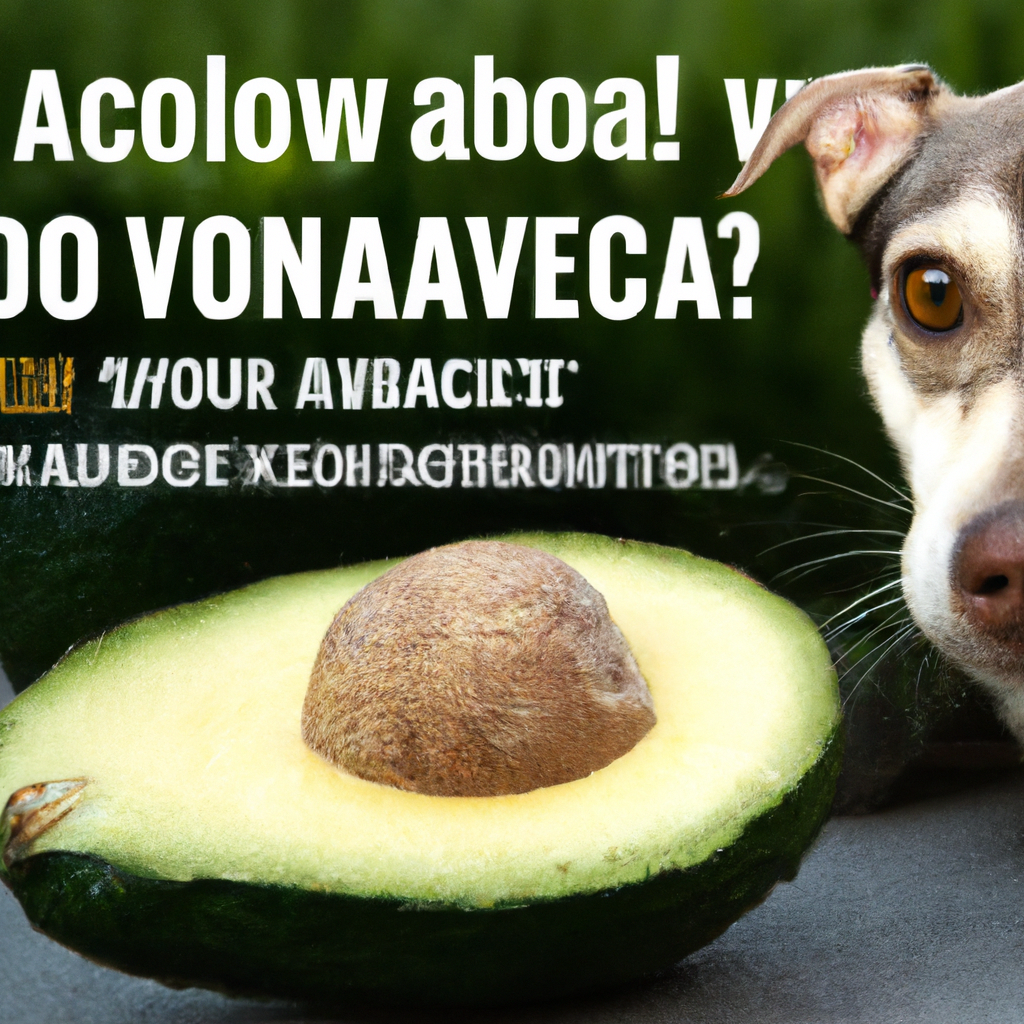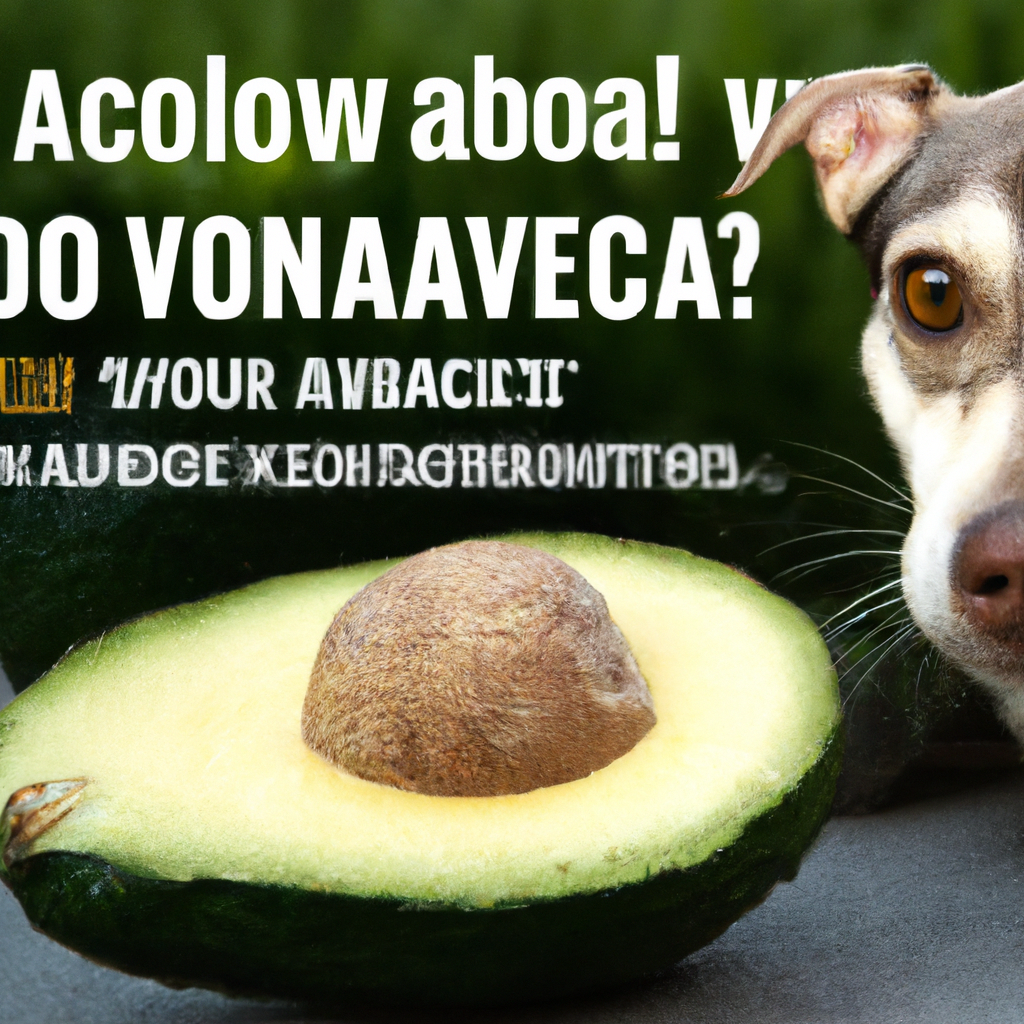Curious about whether dogs can safely snack on avocados or if they should steer clear due to potential toxicity? The debate surrounding whether avocados are safe for dogs to consume has been a recurring topic among pet owners. While avocados offer numerous health benefits for humans, their possible risks for dogs have led to conflicting opinions. In this article, we will explore whether dogs can eat avocados, highlight potential risks, and provide guidelines on how to incorporate this fruit into your furry friend’s diet, all from a friendly and informative perspective. So, let’s jump right in and unravel the mystery of avocado safety for our four-legged companions.
Potential toxicity of avocados for dogs
Avocados are a popular and nutritious fruit enjoyed by many people around the world. However, when it comes to our furry friends, there are some concerns regarding the potential toxicity of avocados for dogs. While avocados contain a compound called persin, which is toxic to dogs in large amounts, it is important to understand the levels of toxicity and the potential risks associated with feeding avocados to our canine companions.
Understanding the toxic components in avocados
The primary toxic component in avocados is persin. Persin is a natural fungicidal toxin that is found in the leaves, bark, skin, and pit of the avocado. In small amounts, persin is generally safe for dogs to consume. However, in large quantities, such as those found in the avocado pit, persin can cause toxicity in dogs.
Symptoms of avocado poisoning in dogs
If a dog consumes a large amount of avocado or is particularly sensitive to persin, they may experience various symptoms of avocado poisoning. It is important to be aware of these symptoms in order to recognize potential avocado toxicity in your dog.
Digestive issues
One of the most common symptoms of avocado poisoning is digestive issues. Dogs may experience upset stomach, abdominal pain, and diarrhea after consuming avocados. These symptoms can range from mild to severe, depending on the amount of avocado ingested and the dog’s individual sensitivity to persin.
Vomiting and diarrhea
Vomiting and diarrhea are common symptoms that may occur as a result of avocado toxicity in dogs. These symptoms can lead to dehydration and discomfort for your furry friend. It is important to monitor your dog closely if they have ingested avocados and seek veterinary care if these symptoms persist or worsen.
Respiratory distress
In some cases, avocado toxicity can lead to respiratory distress in dogs. This can manifest as difficulty breathing, wheezing, or coughing. If your dog is experiencing any respiratory symptoms after consuming avocados, it is crucial to seek immediate veterinary attention.
Fluid accumulation in chest or abdomen
Avocado toxicity can also cause fluid accumulation in the chest or abdomen of dogs. This can lead to difficulty breathing, as well as discomfort and potential complications. If you notice any swelling or changes in your dog’s breathing patterns after avocado consumption, it is important to contact your veterinarian promptly.
Lack of appetite
Another symptom of avocado poisoning in dogs is a sudden lack of appetite. If your dog typically has a healthy appetite but suddenly shows no interest in food, it could be a sign of avocado toxicity. It is important to monitor their eating habits and seek veterinary advice if their lack of appetite continues for an extended period of time.

The levels of toxicity in different parts of the avocado
When it comes to avocado toxicity, it is important to consider the different parts of the fruit. The levels of toxicity can vary depending on whether it is the flesh, skin, or pit of the avocado.
Avocado flesh
The flesh of the avocado is generally safe for dogs to consume in small to moderate amounts. The levels of persin in the flesh are relatively low and unlikely to cause toxicity in most dogs. However, it is still important to feed avocados in moderation and monitor your dog for any adverse reactions.
Avocado skin and pit
On the other hand, the skin and pit of the avocado contain higher levels of persin and pose a greater risk of toxicity. It is important to keep your dog away from avocado skins and pits, as chewing on them or ingesting large amounts can lead to severe symptoms of avocado poisoning.
Can dogs eat small amounts of avocado?
While small amounts of avocado flesh are generally considered safe for dogs, it is best to exercise caution and moderation. Due to the varying sensitivity and tolerance levels in dogs, it is difficult to guarantee that every dog will tolerate avocado without any adverse effects. If you choose to feed your dog small amounts of avocado, closely monitor their reaction and consult with your veterinarian if you have any concerns.

Risks associated with feeding avocados to dogs
Feeding avocados to dogs can pose several risks that are important to be aware of.
Gastrointestinal blockage and choking hazard
The pit and skin of avocados are a choking hazard for dogs and can also cause gastrointestinal blockages. If a dog ingests a pit or large pieces of avocado skin, it can potentially lead to serious complications that may require surgical intervention. To prevent these risks, it is essential to keep avocados out of reach of dogs and avoid feeding them avocado skins or pits.
Allergic reactions
While rare, some dogs may have allergies to avocados. Allergic reactions can vary in severity, ranging from mild itching and skin irritations to more severe symptoms such as facial swelling, difficulty breathing, or even anaphylaxis. If you suspect that your dog may be allergic to avocados, it is important to avoid feeding them this fruit and consult with a veterinarian for proper diagnosis and guidance.
Pancreatitis
Avocado consumption has also been linked to pancreatitis in dogs. Pancreatitis is an inflammation of the pancreas that can cause severe abdominal pain, vomiting, diarrhea, and other digestive issues. Dogs with a history of pancreatitis or those prone to this condition should avoid avocados altogether.
Avocado-based dog foods and treats
In recent years, there has been an increasing availability of avocado-based dog foods and treats in the market. While these products are specifically formulated with safe levels of avocado for dogs, it is important to note that they are still not suitable for all dogs. It is essential to consult with your veterinarian before introducing any new food or treats into your dog’s diet, including avocado-based products.
Commercial dog foods containing avocado
Some commercial dog food brands may include avocado as an ingredient in their formulations. These products undergo rigorous testing and quality control to ensure that the avocado levels are safe for consumption by dogs. However, it is still crucial to read ingredient labels carefully and consult with your veterinarian to determine if these avocado-based dog foods are suitable for your individual dog.
Homemade avocado dog treats
If you are considering preparing homemade dog treats using avocados, it is important to be cautious. Not all homemade recipes are safe for dogs, and some may contain ingredients that are toxic to them. Before making any homemade treats, it is best to consult with your veterinarian or a veterinary nutritionist to ensure that the recipe is safe and appropriate for your dog’s dietary needs.

What to do if your dog consumes avocado
If you suspect that your dog has consumed avocado, there are certain actions you can take to mitigate potential risks.
Immediate actions to take
If your dog has ingested avocado, the first step is to remove any remaining avocado from their reach to prevent further consumption. If your dog has swallowed a large piece of avocado skin or pit, it is important to monitor them closely for any signs of distress or choking. If necessary, you can perform the Heimlich maneuver or seek veterinary assistance if the situation worsens.
When to contact a veterinarian
If you notice any concerning symptoms such as vomiting, diarrhea, respiratory distress, or abdominal swelling, it is important to contact your veterinarian immediately. They will be able to provide guidance and determine the best course of action for your dog’s health and well-being.
Safe alternatives to avocados for dogs
While avocados may not be the best choice for dogs due to their potential toxicity, there are plenty of safe and healthy alternatives to incorporate into their diet.
Healthy fruits and vegetables for dogs
Many fruits and vegetables are safe and beneficial for dogs to consume. Some examples include apples, blueberries, carrots, and sweet potatoes. These fruits and vegetables offer a variety of nutrients that can contribute to your dog’s overall health and well-being.
Beneficial human foods to share with your dog
Certain human foods can be safely shared with dogs in moderation. Lean proteins such as chicken, turkey, and fish can be a nutritious addition to their diet. Additionally, plain, unsalted peanut butter can serve as a tasty and healthy treat for your furry friend.

Conclusion
While avocados may be a nutritious and delicious fruit for humans, it is important to exercise caution when it comes to feeding them to our canine companions. The primary toxin in avocados, persin, can be toxic to dogs in large amounts or if they are particularly sensitive. It is best to avoid feeding avocados to dogs, especially the skin and pit, to prevent potential avocado poisoning and associated risks. Instead, opt for safe alternatives and consult with your veterinarian for advice on the best diet for your furry friend. By prioritizing their health and well-being, you can ensure a long and happy life for your beloved dog.




